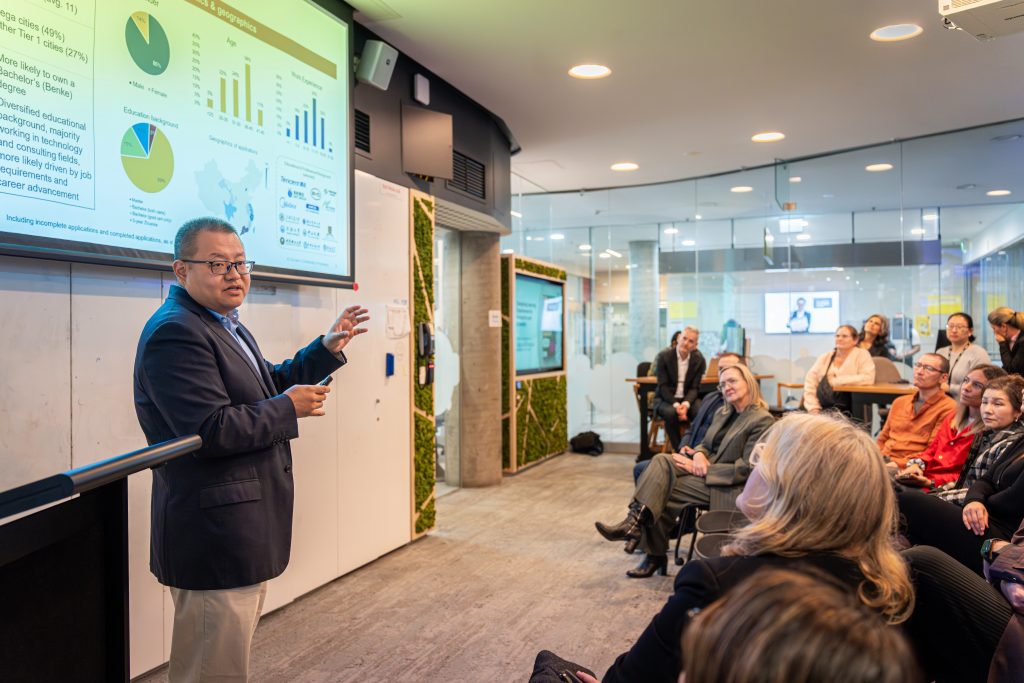UTS has taken a bold step into the future of education with the launch of its Global and Digital Growth Program. Via a partnership with CinLearn (an affiliate of Cintana Education), an initial suite of online postgraduate programs will enable working professionals in China to access a UTS education in Mandarin without needing to relocate or study in English. This initiative marks a significant milestone in the university’s journey to expand its reach and impact globally. It also reflects our strategic, values-driven approach to innovation in higher education.
Speaking at a program launch held in the Ed Hub, DVC (Education and Students) Kylie Readman acknowledged the program’s complexities and challenges, with practical barriers ranging from curriculum customisation and student enrolment considerations to systems integration and contract negotiations, while keeping the student experience at front of mind.
We’re going to be engaging with new students who will benefit from a UTS education, who will be proud to be graduates of UTS – who will be learning in a different language, in a different context – but will be out in the world making a difference in the way that all UTS graduates go out in the world and make a difference. Kylie Readman
A new model for curriculum delivery
In her presentation at the launch, Kerstin Schofer (Director, Global and Digital Education Innovation) noted that while financial resilience is a key driver in a volatile international education market, the program’s core strategy is to expand educational access and enhance UTS’s global reputation. By growing globally and digitally, UTS aims to improve its standing and reach, particularly among students challenged by mobility, cost or language.
One of the most innovative aspects of the program is its curriculum delivery model, with a shift from traditional faculty-led teaching to a centralised academic team who focus on curriculum delivery while faculties remain responsible for content, oversight and quality assurance. This team will work alongside in-country facilitators who support students directly through a culturally responsive operating model, as led by a newly appointed Academic Director Online International, Associate Professor Emma Wong.
Rethinking language and learning
The launch was also attended by CinLearn CEO Siyan Li. A key insight from his prior collaborations that explored new models of online education is the potential of native-language instruction to break down barriers and expand access. He challenges the traditional notion that language must be a barrier to education. With advancements in translation technology such as Google glasses and real-time GenAI tools, universities can now teach in students’ native languages without compromising learning outcomes.
Siyan highlighted the significance of offering Graduate Certificate pathways to students who otherwise would not have access to postgraduate education. He believes that universities should be evolving to serve nontraditional learners: working professionals, lifelong learners and those unable to pursue education through conventional pathways. This model allows them to prove their capabilities and potentially continue toward full degrees, and offers a meaningful opportunity for personal and professional growth, especially for those from rural or underprivileged backgrounds.

A framework for future growth
The Global and Digital Growth Program is not without its challenges, but the development and release of these online offerings is a confident, encouraging first step into a new global market. We look forward to sharing more stories and case studies on how this program continues to leverage our learning design and digital learning capabilities, enhanced with an innovative, scalable approach to curriculum delivery.
Photography by Ridha Fardian; the main image shows (L-R) Kerstin Schofer, Kylie Readman, Michelle Hrlec, Emma Wong and Siyan Li
